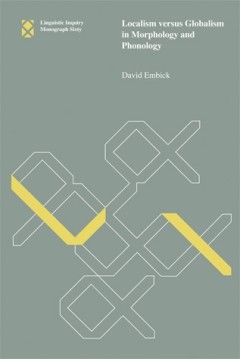Filter by

Type-logical syntax
"In this book, Yusuke Kubota and Robert Levine propose a type-logical version of categorial grammar as a viable alternative model of natural language syntax and semantics. They show that this novel logic-based framework is applicable to a range of phenomena--especially in the domains of coordination and ellipsis--that have proven problematic for traditional approaches."--OCLC-licensed vendor bi…
- Edition
- -
- ISBN/ISSN
- 0262360802
- Collation
- 1 online resource.
- Series Title
- -
- Call Number
- -

Localism versus globalism in morphology and phonology
David Embick offers a detailed examination of morphology and phonology from a phase-cyclic point of view and the only recent detailed treatment of allomorphy, a phenomenon that is central to understanding how the grammar of human language works.OCLC-licensed vendor bibliographic record.
- Edition
- -
- ISBN/ISSN
- 9780262289344
- Collation
- 1 online resource (xii, 218 pages) :illustrations.
- Series Title
- -
- Call Number
- -

Locality in vowel harmony / Locality in Vowel Harmony
This work offers phonologists new evidence that viewing vowel harmony through the lens of relativized minimality has the potential to unify different levels of linguistic representation and different domains of empirical inquiry in a unified framework.
- Edition
- -
- ISBN/ISSN
- -
- Collation
- 1 online resource (xii, 244 pages) :
- Series Title
- -
- Call Number
- -

The syntax of adjectives :a comparative study
In The Syntax of Adjectives, Guglielmo Cinque offers cross-linguistic evidence that adjectives have two sources. Arguing against the standard view, and reconsidering his own earlier analysis, Cinque proposes that adjectives enter the nominal phase either as “adverbial” modifiers to the noun or as predicates of reduced relative clauses. Some of his evidence comes from a systematic comparison…
- Edition
- -
- ISBN/ISSN
- 9780262289306
- Collation
- 1 online resource (xv, 202 pages) :illustrations.
- Series Title
- -
- Call Number
- -

Distributed reduplication
A convincing account of reduplicative phenomena has been a longstanding problem for rule-based theories of morphophonology. Many scholars believe that derivational phonology is incapable in principle of analyzing reduplication. In Distributed Reduplication, John Frampton demonstrates the adequacy of rule-based theories by providing a general account within that framework and illustrating his pr…
- Edition
- -
- ISBN/ISSN
- 9780262258777
- Collation
- 1 online resource (xiv, 228 pages) :illustrations.
- Series Title
- -
- Call Number
- -

The locative syntax of experiencers
Experiencers—grammatical participants that undergo a certain psychological change or are in such a state—are grammatically special. As objects (John scared Mary; loud music annoys me), experiencers display two peculiar clusters of nonobject properties across different languages: their syntax is often typical of oblique arguments and their semantic scope is typical of subjects. In The Locati…
- Edition
- -
- ISBN/ISSN
- 9780262259026
- Collation
- 1 online resource (vi, 165 pages) :illustrations.
- Series Title
- -
- Call Number
- -

Ivory Bridges: Connecting Science and Society
A study of two bridges between science and society: governmental science policy and scientists' voluntary public-interest associations. According to a widespread stereotype, scientists occupy an ivory tower, isolated from other parts of society. To some extent this is true, and the resulting freedom to pursue curiosity-driven research has made possible extraordinary scientific advances. The spi…
- Edition
- 1
- ISBN/ISSN
- 9780262284073
- Collation
- -
- Series Title
- -
- Call Number
- -

Japanese Morphophonemics: Markedness and Word Structure
Illustrated critical essays on the work of artist James Coleman.James Coleman has emerged in recent years as one of the most important artists of visual postmodernism. His work has transformed critical debates about the status of the image in contemporary culture and influenced an entire generation of younger artists in ways that have not yet been fully acknowledged. Until recently, Coleman has…
- Edition
- 1
- ISBN/ISSN
- 9780262267601
- Collation
- -
- Series Title
- -
- Call Number
- -

Japanese morphophonemics :
The sound pattern of Japanese, with its characteristic pitch accent system and rich segmental alternations, has played an important role in modern phonology, from structuralist phonemics to current constraint-based theories. In Japanese Morphophonemics, Junko Ito and Armin Mester provide the first book-length treatment of central issues in Japanese phonology from the perspective of Optimality T…
- Edition
- 1
- ISBN/ISSN
- 9.78026E+12
- Collation
- -
- Series Title
- -
- Call Number
- -

Journey from Cognition to Brain to Gene: Perspectives from Williams Syndrome
A blueprint for the investigation of neurodevelopmental disorders, this book presents the work of a team of scientists using a multidisciplinary, integrated approach to link genes with human behavior. Using Williams syndrome as a model, leading researchers in neuroanatomy, neurocognition, neurophysiology, and molecular genetics have built bridges between disciplines to link higher cognitive fun…
- Edition
- 1
- ISBN/ISSN
- 9780262287395
- Collation
- -
- Series Title
- -
- Call Number
- -
 Computer Science, Information & General Works
Computer Science, Information & General Works  Philosophy & Psychology
Philosophy & Psychology  Religion
Religion  Social Sciences
Social Sciences  Language
Language  Pure Science
Pure Science  Applied Sciences
Applied Sciences  Art & Recreation
Art & Recreation  Literature
Literature  History & Geography
History & Geography